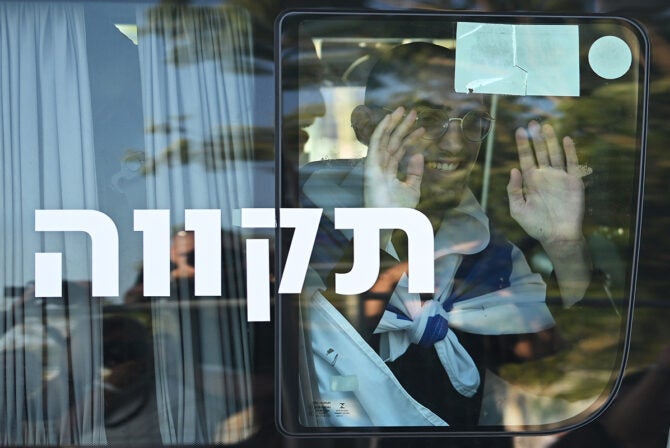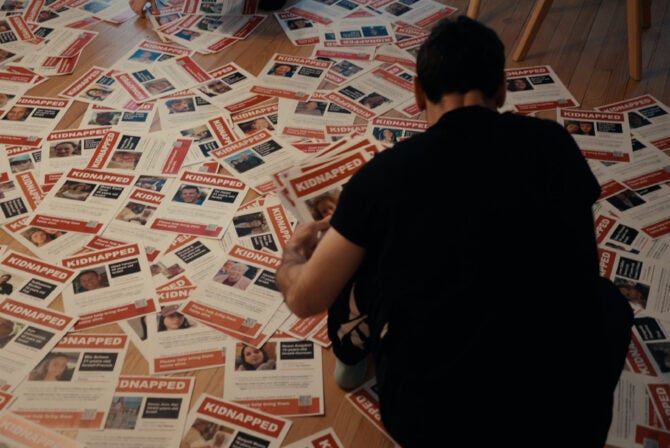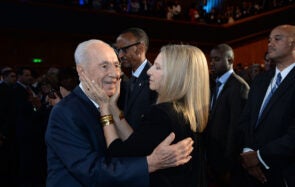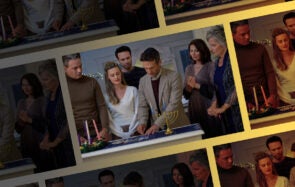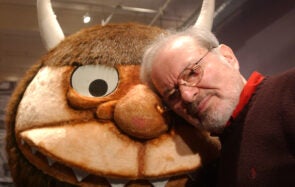Having lived in Israel for the past 20 years, I have mostly stopped paying attention to the plethora of American holidays: Christmas, Columbus Day, Halloween, Presidents Day. They come and go without a single thought or day off from work.
While driving this week, I noticed a giant banner on the highway, “Black Friday Sale, 20-25/11/17.” All the malls in Jerusalem seem to be advertising a week’s worth of discounts and special deals, in honor of Black Friday, America’s hellish, post-Thanksgiving shopping day (even if most Israelis are unlikely to understand the “Black Friday” reference).
Most of my Anglo friends who have relocated to Israel either ignore Thanksgiving completely or they serve turkey at their Friday night Shabbat dinner — a vague reference to the holiday. Not me. I take Thanksgiving quite seriously. It’s in my top three favorite holidays of the year (Sukkot, Thanksgiving, Hanukkah). Every year my daughter and I attend a catered Thanksgiving dinner at the Inbal Hotel in Jerusalem, where we meet up with our fellow devout Thanksgiving followers, and feast on turkey and all the trimmings, and, of course, pumpkin pie for dessert.
We all partied extra hard the year that Hanukkah and Thanksgiving fell out on the same day (remember Thanksgivukkah?), and added jelly doughnuts to the mix for dessert.
But my Thanksgiving celebration has to do with America. I have the fondest memories from childhood of Thanksgiving at my grandparents’ house, and it is the tradition of thankfulness and family that I will perpetuate with my own daughter.
My grandmother was born in Jerusalem, in British Mandate Palestine, in 1922. She moved to America with her parents as a child. Her father, my great-grandfather, had been a member of the Jewish Underground and had a British death sentence hanging over his head. When they moved to America, my great-grandfather served as a chaplain in the U.S. Army, having received his rabbinic ordination from Rav Kook. That was his day job, but as a man with a photographic memory and eight languages at his fingertips, he also assisted the Americans in other ways, things he did not talk about because none of us had the proper security clearance.
My grandmother took her American citizenship very seriously, and Thanksgiving was one of two holidays that my entire mother’s side of the family (all 25 of us) gathered for at their modest colonial house. One-and-a-half bathrooms for 25 people, from Wednesday afternoon to Sunday afternoon.
It was there that I became close with my cousins, and those connections remain. At one celebration we were all at, I heard someone say, as our family passed by, “Look at them, they travel in a pack.” It was true, and fierce, and my grandmother gets all the credit for that. She was the glue that kept us all together, and as the oldest grandchild, I had a special connection to her.

The author’s great-grandfather, great-grandmother, and grandmother, Jerusalem, British Mandate Palestine.
The boy grandchildren, who held the majority, took over the basement, with eight cots lined up in a row like a military bunk house. The three girl grandchildren were shifted from room to room, floor to floor, and we never quite had the comfort or the privacy that we wished for. But we did it because Bubby and Zaide said so, and their word was law.
The amount of food we ate is beyond imaginable to me now, as a doctor. My grandfather always boasted that his wife was the best cook and pastry chef in all of Providence, and anyone who knew her in the Jewish community would not have argued. She would bake everyone’s favorite cookie, and of course all 25 of us had our own preferences. The smell of cinnamon wafted through the house when you opened the door, and enveloped you like a beautiful dream. Full meals Wednesday night, the traditional Thanksgiving meal, and don’t forget all of Shabbat. Full breakfasts, made-to-order, each of those days.
When I was an adult, I learned about another meal, the secret midnight deli feast, to which only children over a certain age and maturity were invited. A full spread of deli meat and rolls, pickles and coleslaw and salads. Because we all hadn’t eaten enough several hours before.
Macy’s Day Parade in the morning, followed by football, predominantly watched by the menfolk.
There were the predictable discussions and arguments: about how my grandfather, a workaholic, did not take my grandmother on enough trips. About which movie we would all see Thursday afternoon, after the grand feast. About which of the grandchildren was most accomplished, each parent jostling for a little piece of recognition and respect.
On Thursday afternoon before the biggest meal of the weekend, any person in the house who played a musical instrument would perform. My mother and her two sisters, classically trained in music and voice, would sing a piece of Handel’s Messiah in perfect harmony. Then my grandmother would take out one of many random boxes of slides, photos she had converted over the years. You never knew what part of the history of our family would be showcased that afternoon.
It was at these Thanksgiving weekends that we would bring boyfriends and girlfriends, prospective soulmates, to get the approval of the family, the clan, the pack. It was at these Thanksgiving weekends that we got engaged or announced pregnancies. And my grandparents would crow with pride and delight, witnessing the perpetuation of their line.
When I sit at Thanksgiving dinner with my daughter in Jerusalem, my beautiful girl named after my grandmother born in Jerusalem four generations earlier, that is what I remember, and that is what I pass onto my child. I only regret that my grandmother didn’t live to meet her namesake. I think they would have gotten along famously.
